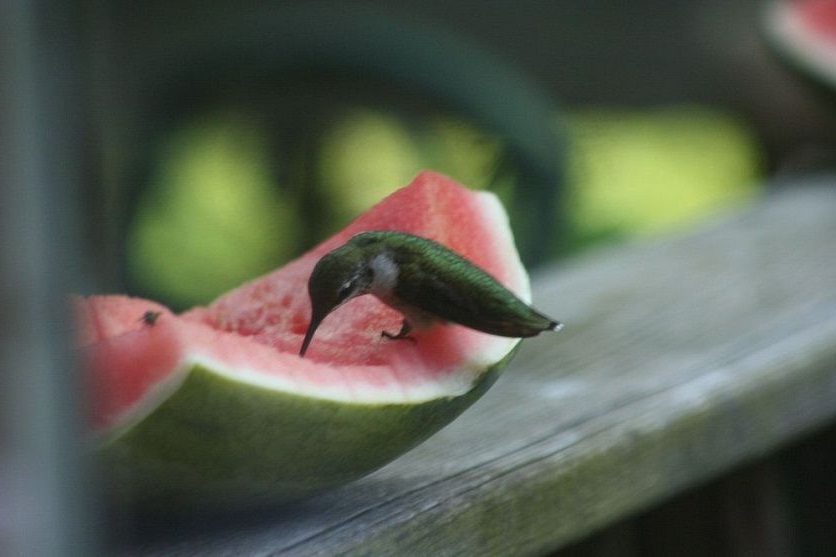

We’re here to help! Wild Yards is a completely free website that is 100% dedicated to helping you create a wildlife-friendly, sustainable yard. Read more
WildYards is reader-supported. When you buy a product through a link on our site, we may earn a comission. Every product is independently selected by our (obsessive) editors and our reviews are unbiased and objective. Read more about our mission or our privacy policy.
If you’re a hummingbird enthusiast, you probably know that sugar, usually in the form of nectar, is a hummingbird’s primary source of energy. Flowers and bird feeders aren’t the only places you can find sugar, though. You may even be wondering if hummingbirds can eat fruits like watermelon.
Yes, hummingbirds have been observed slurping up watermelon juice. Many gardeners have caught them stealing a sip when the fruit has been left out where they can access it.
To the hummingbirds in your yard, watermelon juice is just another source of sugar. It’s one of the tastier options on the menu for them, but unfortunately, it’s not the most energy-efficient or the healthiest.
Hummingbirds have a ridiculously high metabolism and need to eat nectar once every 15 minutes or so to survive. This is why it’s so important to mix the homemade hummingbird nectar you use in your feeders properly. Too much of the wrong water-to-sugar ratio could cause your hummingbirds to become sluggish and run out of energy.
Is watermelon dangerous to hummingbirds?
Has a hummingbird hijacked your summer snack? Don’t worry, that watermelon slice you left out on the patio isn’t going to hurt any intrepid hummers. The occasional sip of watermelon is perfectly safe for hummingbirds.
That doesn’t mean you should start adding it to your hummingbird feeder, though. Hummingbird nectar sits out in the hot sun for days on end, so it needs to be pure and free of any contaminants to keep it from spoiling. Adding just a little bit of watermelon juice to the mix may seem like a tasty recipe that your hummingbirds will love, but the juice is likely to ferment and could cause the nectar to become toxic.
What kinds of fruit do hummingbirds eat?
Hummingbirds have been known to sample many different fruits when they are made available, not just watermelon. They enjoy other types of melons, pears, oranges, berries, and plenty of other fruits. Anything they can get a good amount of juice out of, they’ll try.
Is watermelon in a hummingbird’s natural diet?
The sugar found in nectar is a hummingbird’s primary source of energy, but nectar is less than 10% of their diet. They need other nutrients like protein and minerals, and for that, they turn to insects and spiders. Insects like gnats, mosquitos, beetles, mites, aphids, and fruit flies are all on the menu.
This is part of why hummingbirds are more attracted to flower-filled gardens than they are to barren yards with plenty of hummingbird feeders. They enjoy some variety in their diet as much as you do, and the fact that the flowers attract pollinators and other insects is an added benefit.
In their natural environment without any human presence, it would be pretty unlikely for a hummingbird to have access to watermelons or any of the other fruits that they like. Most of the fruits that are nice and juicy also have a rind too thick for them to puncture. Short of another bird pecking the melon open and leaving it behind, it’s just not feasible for most fruit to be a part of a hummingbird’s natural diet.
Fruit Makes A Sweet Treat For Hummingbirds
If you want to give your hummingbirds the occasional slice of watermelon, there’s no reason not to treat them from time to time. That’s also true for any other juicy summer fruit you might have on hand. Just remember not to leave it out longer than a day or so, otherwise, it could rot and become toxic to them.
You should also consider any fruit you give your hummingbirds to be a treat and not a primary part of their diet. Whether you’re leaving out whole pieces of fruit or adding fruit juice to their nectar, you run the risk of the juice fermenting or spoiling.
Consider watermelon and other fruits a bit like a hummingbird dessert, and your hummers will be just fine.
